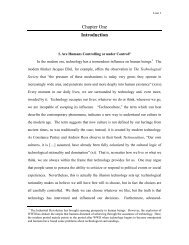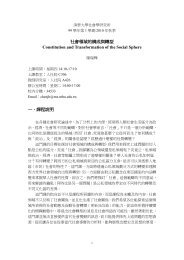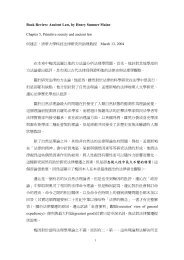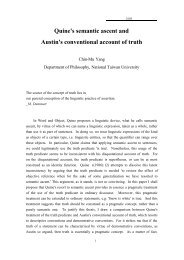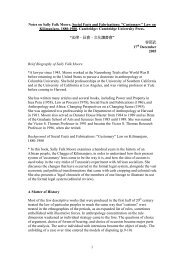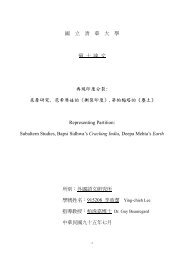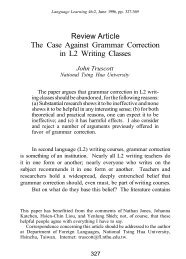Effects of Graded Texts on EFL College Students' Incidental ...
Effects of Graded Texts on EFL College Students' Incidental ...
Effects of Graded Texts on EFL College Students' Incidental ...
Create successful ePaper yourself
Turn your PDF publications into a flip-book with our unique Google optimized e-Paper software.
measurement tool for its functi<strong>on</strong> <str<strong>on</strong>g>of</str<strong>on</strong>g> being able to track early word developments.<br />
Ten target words identified in pretest as completely unknown to all 38 learners were<br />
assigned into five groups according to their amount <str<strong>on</strong>g>of</str<strong>on</strong>g> exposure within the sixteen<br />
texts used in the <strong>on</strong>line extensive reading syllabus.<br />
In the current study, learners’ word gains were observed in all five groups,<br />
including words in group <strong>on</strong>e, the <strong>on</strong>es which appeared <strong>on</strong>ce or twice. This is in<br />
accordance to the findings from Nagy’s (1985; 1987) and Rott’s (1999) studies that<br />
though the improvements were minor, merely <strong>on</strong>e or two exposure <str<strong>on</strong>g>of</str<strong>on</strong>g> target word<br />
could still c<strong>on</strong>tribute to learners’ initial word knowledge. This c<strong>on</strong>tributi<strong>on</strong> <str<strong>on</strong>g>of</str<strong>on</strong>g> <strong>on</strong>e or<br />
two encounters, <str<strong>on</strong>g>of</str<strong>on</strong>g> course, was not adequate for successful word acquisiti<strong>on</strong> <str<strong>on</strong>g>of</str<strong>on</strong>g> more<br />
in-depth knowledge. In fact, the results from our study dem<strong>on</strong>strated that with<br />
scoring below 3 points <strong>on</strong> the VKS scale, learners were unable to successfully recall<br />
the Chinese meanings <str<strong>on</strong>g>of</str<strong>on</strong>g> target words even with words in group five, which c<strong>on</strong>tains<br />
words with exposure amount from 9 up to 15 times. Moreover, very few learners<br />
have attempted trying to make sentences using target words in the posttest. It seems<br />
that exposure amount <str<strong>on</strong>g>of</str<strong>on</strong>g> up to 15 times was unable to guarantee receptive exposure,<br />
let al<strong>on</strong>g more complex and pr<str<strong>on</strong>g>of</str<strong>on</strong>g>ound productive knowledge.<br />
The limited word acquisiti<strong>on</strong> found in our study adds yet another piece <str<strong>on</strong>g>of</str<strong>on</strong>g><br />
evidence supported by already plentiful research that incidental vocabulary<br />
acquisiti<strong>on</strong> while reading could take place; however, its gains could be superficial and<br />
fragile (Wesche & Paribakht, 2000; Hulstijn, 1993; Huckin & Coady, 1999). Given<br />
our various endeavors to foster a vocabulary inducing reading envir<strong>on</strong>ment, learners’<br />
performance seems unsatisfactory at first glance compared to some previous L2<br />
studies assessing learners’ receptive and productive knowledge gain through reading.<br />
Four possible factors might have c<strong>on</strong>tributed to this difference—namely, the use <str<strong>on</strong>g>of</str<strong>on</strong>g><br />
authentic material, learners’ depth <str<strong>on</strong>g>of</str<strong>on</strong>g> processing, target word difficulty, and individual<br />
76



